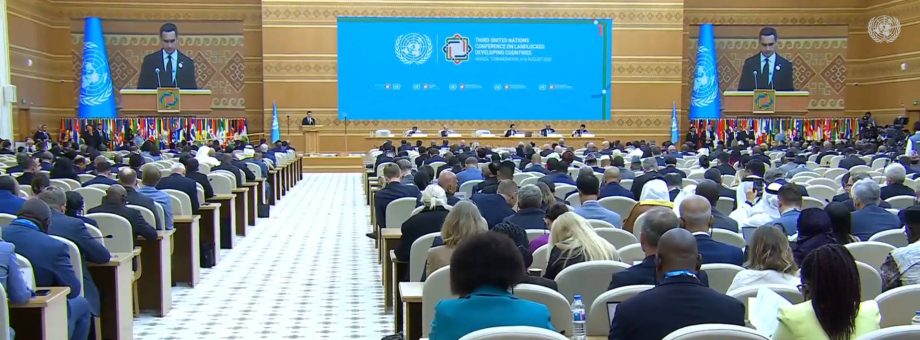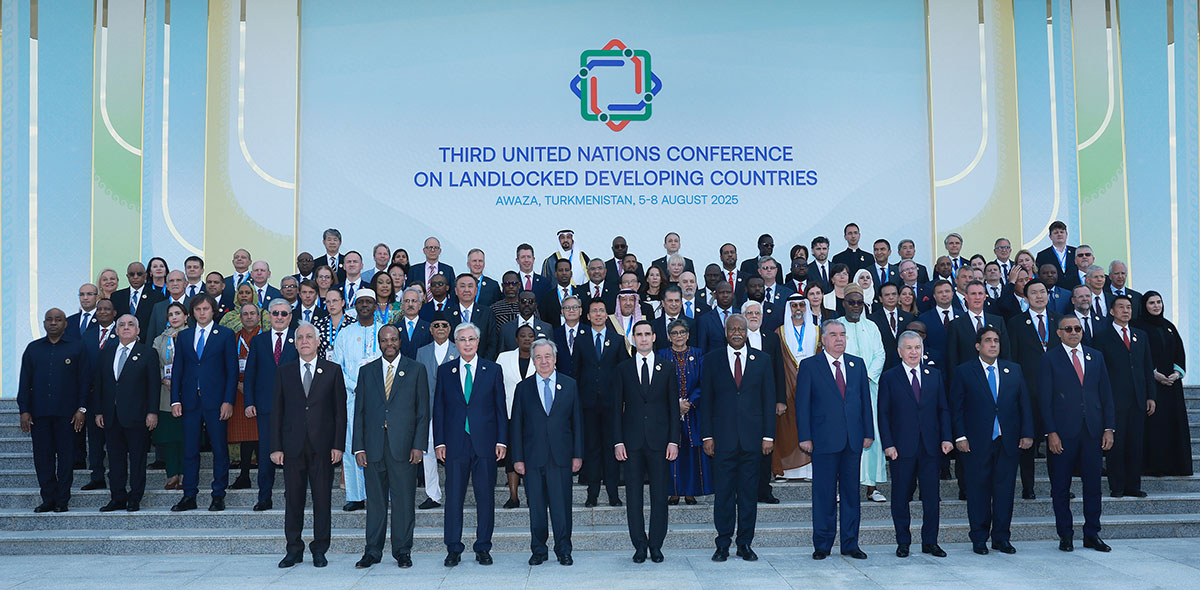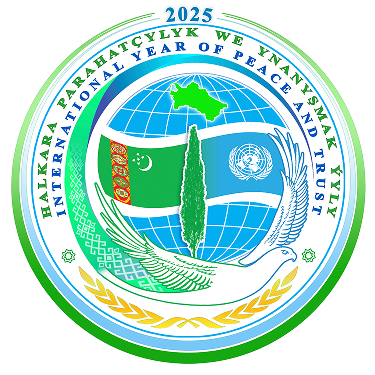Statement by H.E. Serdar Berdimuhamedov, President of Turkmenistan - First Plenary Session of the Third United Nations Conference on Landlocked Developing Countries

Check against delivery
Originally presented in Russian
Awaza, 5 August 2025
Excellencies,
Distinguished Secretary-General of the United Nations, Mr. António Guterres,
President of the 79th Session of the United Nations General Assembly, Mr. Philemon Yang,
President of the Economic and Social Council, Mr. Lok Bahadur Thapa,
Honourable Heads of State and Government, Representatives of International Organizations, Heads and Members of Delegations,
Ladies and Gentlemen,
On behalf of Turkmenistan, I warmly welcome you and express sincere appreciation for your participation in the Third United Nations Conference on Landlocked Developing Countries.
This Conference is directly linked to the urgent challenges of global development and to the implementation of the United Nations' major frameworks - foremost among them, the 2030 Agenda for Sustainable Development and the strategic vision set out in the Pact for the Future.
 From this high rostrum, I extend my gratitude to Secretary-General Guterres and to the representatives of UN Member States for their attention to this Forum and for their unwavering commitment to the comprehensive advancement of landlocked developing countries.
From this high rostrum, I extend my gratitude to Secretary-General Guterres and to the representatives of UN Member States for their attention to this Forum and for their unwavering commitment to the comprehensive advancement of landlocked developing countries.
The themes addressed at this Conference are global in nature - encompassing humanitarian, economic, social, environmental, and other vital dimensions of international cooperation.
I would like to begin by highlighting the importance of humanitarian issues.
Turkmenistan’s state policy is centered on the individual - their needs, rights, intellectual and creative potential, spiritual and physical well-being. “The State for the People” is not merely a slogan - it is the defining principle of our domestic and foreign policy alike.
A fundamental pillar of Turkmenistan’s national strategy is the assurance of high social standards and quality of life. A significant portion of the national budget is allocated to social programs - including housing, healthcare, education, and support for families, mothers and children, youth, the elderly, persons with disabilities, and other vulnerable groups.
Particular attention must be paid to access to quality healthcare. This is a matter of principle that transcends national boundaries. As a socially oriented state, Turkmenistan has gained considerable experience in this field and stands ready to share it widely and to foster broad cooperation with international institutions.
It is in this spirit that I propose today the following initiative: “Global Medicine of the Future – Solidarity and Cooperation.”
The COVID-19 pandemic, and the emergence of new health threats around the world, have demonstrated that global solidarity and mutual support are indispensable to achieving the fundamental human right to health and access to treatment.
This initiative aims to launch a system of international medical diplomacy under the auspices of the United Nations. We believe the UN, through its specialized agencies, funds, and programs, should play a coordinating role in advancing this work.
The timing of this proposal is no coincidence. For landlocked developing countries, the lack of access to seaports remains a major impediment to timely medical assistance, delivery of medicines and equipment, preventive care, and the overall functioning of health infrastructure.
Turkmenistan is ready to contribute practical proposals for the implementation of this initiative and to engage actively with relevant UN structures.
Dear Participants,
A pressing issue for LLDCs is the establishment of a sustainable and inclusive system of connectivity.
Turkmenistan has played an active role in promoting international dialogue on this subject, including through hosting the First UN Global Sustainable Transport Conference in Ashgabat in 2016, and the Ministerial Meeting on Transport for LLDCs in 2022.
Our efforts have resulted in the adoption of six UN General Assembly resolutions on international transport cooperation initiated by Turkmenistan.
In line with the Sustainable Development Goals, Turkmenistan believes that enhanced connectivity must be driven by innovation and fresh impetus. At the World Government Summit in Dubai in 2024, Turkmenistan proposed a new partnership platform: the Global Atlas of Sustainable Transport Connectivity.
I invite all participants to examine this initiative closely. I am confident that its implementation will enhance the integration of LLDCs into global transport and logistics networks.
A key element in this endeavor is ensuring the environmental safety of transport routes, consistent with the global green agenda. This requires the application of advanced technologies.
Environmental priorities are equally central to our country’s approach in the energy sector. The concept of green energy is fundamental to Turkmenistan’s energy strategy, both nationally and internationally. We adhere strictly to international environmental agreements and advocate that all members of the global energy community - producers, transit countries, and consumers - do the same.
In this context, Turkmenistan supports increased investment in renewable energy and expresses readiness to contribute to the development of hydrogen energy. We propose the creation of a Global Programme for the Transition to Hydrogen Energy for 2030–2040, and suggest that discussions on this initiative commence within the UN system as early as next year.
Overall, our environmental policy aims to align economic activities with ecological standards - so that industry supports nature rather than undermines it. To that end, Turkmenistan has proposed the development of a Global Framework Programme for the Transition to a Circular Economy.
Recognizing the urgency of the climate crisis, we commend the implementation of the UN Framework Convention on Climate Change (UNFCCC) and welcome the progress made in recent COP negotiations. LLDCs must be meaningfully engaged in the emerging global climate architecture.
Environmental concerns also extend to regional ecosystems. For many LLDCs, the Caspian Sea is a critical waterway. Turkmenistan initiated the Caspian Environmental Initiative at the 78th session of the General Assembly, envisioning a platform for dialogue on protecting the Caspian ecosystem - particularly in light of the alarming decline in sea levels.
Similarly, the Aral Sea remains a shared environmental concern. Turkmenistan calls for the establishment of a UN Special Programme for the Aral Sea Basin, building on General Assembly resolutions and ESCAP recommendations initiated by our country.
Water security, in general, is integral to global peace and development. Turkmenistan believes that equal and equitable access to water is a fundamental human right. Water-related issues must be addressed on the basis of three core principles: compliance with international law, mutual consideration of interests, and the engagement of international organizations, particularly the United Nations.
Distinguished Participants,
This year, 2025, was proclaimed by the United Nations as the International Year of Peace and Trust - an initiative of Turkmenistan. We also celebrate the 30th anniversary of the international recognition of Turkmenistan’s permanent neutrality - an enduring foundation of our foreign policy.
It is symbolic that these commemorations coincide with the 80th anniversary of the United Nations.
Peace, trust, and neutrality - these values define Turkmenistan’s engagement with the international community and underpin our strategic partnership with the United Nations.
This applies equally to today’s Conference. Together with the UN, our friends and partners from dozens of countries, and leading international organizations, we are gathered here in Turkmenistan to discuss the unique challenges of landlocked developing countries and to chart the way forward.
We do so with a spirit of inclusivity, cooperation, and shared responsibility - for our peoples and for future generations.
I am confident that we are on the right path, and that by working together, we will achieve lasting and tangible progress.
Let me once again express my gratitude to all delegations and distinguished guests for your commitment and partnership with Turkmenistan in promoting development, progress, and well-being.
I wish you a successful and productive Conference.
Thank you.


 STATEMENTS
STATEMENTS